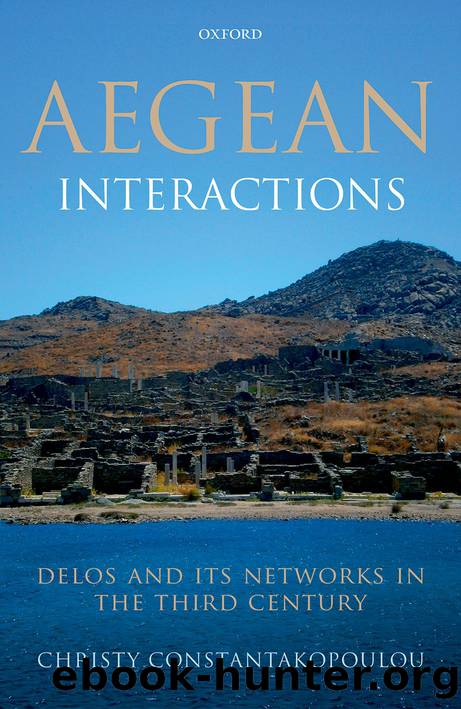Aegean Interactions: Delos and its Networks in the Third Century by Christy Constantakopoulou;

Author:Christy Constantakopoulou; [Constantakopoulou, Christy]
Language: eng
Format: epub
ISBN: 9780191091179
Publisher: OUP Premium
Published: 2017-05-29T00:00:00+00:00
4.4. The Delian Network of Honours
We have spent some time examining the questions of publication, audience, language, purpose, and reasoning for the honours that we see epigraphically attested on Delos during the period of Independence. Such questions have been at the centre of scholarly interest in relation to the award of honours (especially proxeny decrees). They have also been one of the main sources through which modern scholars have attempted to reconstruct the history of Delos, and the social, economic, and religious life of the island.252 My main interest, however, is what these sources tell us about the Delian network of honours. In other words, can we use this type of epigraphic evidence to reconstruct the network of associations between the demos of the Delians and outside individuals? Unfortunately for us, and contrary to other places from Hellenistic Greece, we lack a catalogue of all Delian proxenoi in a particular period. Such catalogues have been the basis for Mackâs successful reconstruction of the proxeny networks for a number of Aegean cities, as these catalogues give us a relatively accurate picture of all the attested relations between one city and its honoured individuals at a given point in time.253 Yet, despite the absence of a catalogue of proxenoi, it is possible to reconstruct the Delian network of honours for the third and early second centuries, using the existing evidence.
The main starting point for the creation of a map of the Delian network of honours is the presence of the ethnic of the honorand in the epigraphic evidence. In the case of the proxeny decrees, which are our main source, this is relatively straightforward: the ethnic name is normally an indispensable part of the honours awarded, and as such it is almost always included, with only two exceptions of omission from the entire Delian corpus.254 We can therefore use the attested ethnics in our honorific decrees,255 as well as the known ethnics for Hellenistic rulers and other prominent individuals honoured with statues and crowns,256 in order to visualize the Delian network of honours. But, as is normally the case with the use of ethnics in epigraphic evidence,257 this is not a straightforward process, as there are a considerable number of problems.258
The main issue is, once again, that of context.259 The ethnic designates the polis (normally) of origin of the honorand. But was the polis of origin the primary context in which the Delians established a relationship with the honorand, which resulted in the award of honours? In many instances, this was definitely the case; but we have firm evidence that this was not so in a number of occasions. We have explored how the Delians were particularly concerned about access to power, and as a result honoured influential individuals, especially in the court of the Hellenistic kings, who facilitated the Deliansâ dealing with such royal authority. In these cases, the primary context of initial contact and for creating a relationship for the present and the future with the honorand was that of the Hellenistic court.
Download
This site does not store any files on its server. We only index and link to content provided by other sites. Please contact the content providers to delete copyright contents if any and email us, we'll remove relevant links or contents immediately.
| Ancient & Classical | Greek |
| Medieval | Roman |
Letters From a Stoic by Seneca(2339)
The Valmiki Ramayana: Vol. 1 by Bibek Debroy(2178)
The Valmiki Ramayana: Vol. 2 by Bibek Debroy(2038)
The Valmiki Ramayana: Vol. 3 by Bibek Debroy(1861)
Mary Boleyn by Alison Weir(1464)
The Greeks by H. D. F. Kitto(1434)
The Notebooks of Leonardo Da Vinci by Da Vinci Leonardo(1253)
Mythos (2019 Re-Issue) by Stephen Fry(1187)
Art of Living by Sellars John;(1177)
The Voynich Manuscript by Gerry Kennedy(1165)
Annals by Tacitus(1161)
Medea and Other Plays by Euripides(1152)
The Classics by Mary Beard(1091)
Claudius the God by Robert Graves(1041)
Kadambari: Bana by Bana(1007)
Appeasement of Radhika by Muddupalani(1003)
Atlantis the Lost Continent Finally Found by Arysio Santos(1001)
THE REPUBLIC by plato(994)
Beyond Control by Anthology(983)
